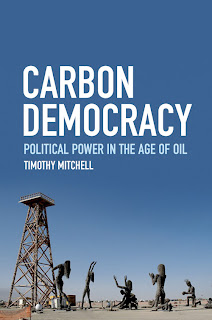Note that this is not a review. I have not yet read Timothy Mitchell's Carbon Democracy which tells a story of how it was coal that brought us democracy, but then oil has brought us...something else. His novel, in a unique way intertwines the development of energy sources with the development of new political systems.
From Chapter One:
Modern mass politics was made possible by the development of ways of living that used energy on a new scale. The exploitation of cal provided a thermodynamic force whose supply in the nineteenth century began to increase exponentially. Democracy is sometimes descrived as a consequence of this change...
Matt Stoller had a review at Naked Capitalism, in which he made the following point:
How Coal Brought Us Democracy, and Oil Ended It: Lessons from the New Book "Carbon Democracy" Matt Stoller, Naked Capitalism, 13 Septemeber 2012
The ultimate conclusion of the book is that a climate crisis, and peak oil, are putting our deeply held political arrangements in a period of uncertainty and crisis. Once you’ve gone on this journey through time, and you understand Mitchell’s narrative that our very intellectual horizons are dominated by oil as a surplus and infinite commodity, it becomes hard to conclude that our cultures will look remotely similar to what they look like today in just a few years. Against this sweeping narrative, our current political debates seem incredibly tiny, almost irrelevant. We have, as it turns out, been living in a land of fairy tales about how our society works, because we’ve been ignoring what powers it, oil, and what drives that commodity. The pipelines, the wells, the financial channels, these construct our physical society, as well as the intellectual environment in which we conceive of and organize our social relations.
I agree with this particular point. But the naratives I read all seem to focus on the "undemocratic" Middle East. While, to some degree, all of that is true, it is to some degree an accident of geography and geology. Oil has been found all over the place, and one of the early big producers was the United States, and the Japanese went to war with the United States to get their hands on the Dutch East Indies, not Iran/Persia.
That big oil would be become politically powerful does not strike me as being a particularly unique phenomina. The British took over Egypt over the issue of debt collection, and the British-German blockade of Venezuela in 1904 also involved interference with business interests. Possibly the most extreme example, "The Opium Wars" where the opium-exporting British went to war over the Chinese Emperorer's bans on opium dens, names the very interest involved: which is not "Big Oil". Shoot, the Opium War preceedes the extensive use of oil by a number of years.
Its just that the Empires of that day had not yet stumbled onto the concept of buying their empires through cash and trade, and thus tended to back up their business in a more blunt fashion. The militiary intervention on behalf of oil is not the first time the Western Economy has used the stick of its military to get what it wanted.
I have flipped through enough of the book to see that the "blurb" reviews are mostly doing it an injustice. I suppose I will have to take a closer look and see for myself.

3 comments:
Came across an article late last night regarding a new trade arrangement China and Russia made on Sept 6th. They now allow large scale trade of Iranian oil in the Renminbi. Not sure how it went unnoticed as that is a huge big deal. I was going to link it later today because if it holds then the last real vestige of the dollars strength is in danger.
Might have to go out and buy it as well. I really think that the access to cheap oil is the main prop underpinning our current political system.
The political loss of legitimacy due to an increasingly constrained oil supply is becoming evident. While lack of oil is not the only factor in the current set of problems, it is most certainly a major one.
It will be interesting to watch.
Pioneer: The Renminbi is just about as much a funny money currency as the dollar. In fact it is the Chinese unreasonably low peg to the dollar that causes them to have so many dollars on hand. The real currency is the oil. I take this more as the Iranians trying to get around Western restrictions. Now if the Russians actually start selling large amounts of oil to China and taking Renminbi instead, that would be interesting.
Degringolade: It looks interesting. The author, as is typical of these breathless expository essays, overstates his case, but that doesn't mean his points are not worth looking at. His argument that the British Navy went to oil to give the shaft to the minors could be flipped around and said that if a source is only erratically available, people will find alternate sources.
Post a Comment